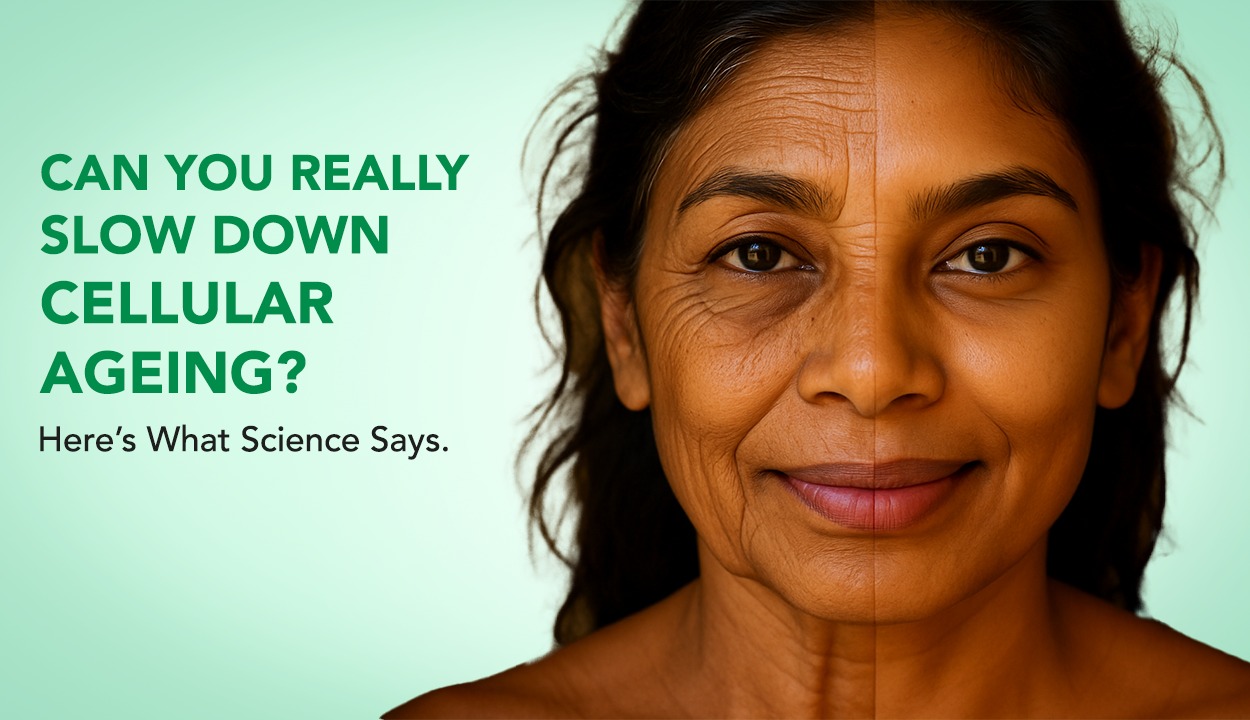
Can You Really Slow Down Cellular Ageing? Here’s What Science Says.
We’ve all seen the rising wave of anti-ageing advice across social media—fitness routines, skincare hacks, diet trends. But underneath the buzz lies a scientific question: can we actually slow down the ageing process at the cellular level?
The short answer: no, we can’t stop cellular ageing. But yes, we can slow it down—and that can make a big difference to how youthful, healthy, and energetic we feel over time.
Let’s understand how.
The Science of Cellular Ageing
Throughout infancy, adolescence, and youth, our cells divide, multiply and regenerate to keep us functioning. As we age, our body’s ability to do so declines. After reaching a certain stage, they stop dividing and exit the cellular cycle- a phenomenon called cellular senescence.
Senescent cells don’t die immediately but stop working effectively. They accumulate over time and contribute to tissue damage, inflammation, and age-related decline. While ageing is natural, certain environmental and lifestyle factors—like radiation, poor nutrition, or stress—can accelerate this process.
Why Slowing Cellular Ageing Matters?
An important question about cellular aging is whether it can be stopped. The answer is no. However, it can be slowed down. Delaying the onset of senescence can help extend the healthy years of our lives. It can also improve organ function, skin health, immunity, and energy levels.
A Healthy and Healing Diet is the Key to Slowing Cellular Ageing
Your food directly impacts your cells. Here’s how a healing diet can help slow down cellular ageing:
- Power of Antioxidants: Antioxidants help neutralize oxidative stress—a key contributor to cellular damage. Hence, include foods rich in antioxidants like leafy greens, berries, and citrus fruits to reduce cellular wear and tear.
- Fight Inflammation with Food: Chronic inflammation accelerates ageing. Processed foods, sugars, and trans fats worsen this. Instead, opt for anti-inflammatory foods like fatty fish, nuts, olive oil, turmeric, and fresh vegetables.
- Avoid Overeating: Calorie overload can burden cells and reduce their efficiency. Controlled calorie intake and mindful eating support better cell performance and delay senescence.
Be on the Move to Slow Cellular Ageing
Physical activity is a great and a proven way to reduce inflammation and improve cell function. A key reason lies in telomeres—protective caps at the end of chromosomes. These shorten as we age, but exercise can slow this shortening.
- Endurance training: Aerobic exercises such as running, walking, cycling, swimming, etc., improve cardiovascular health, enhance mitochondrial function, and increase telomerase activity.
- High-intensity interval training HIIT: High-intensity workouts such as sprints, burpees, mountain climbers, squats, push-ups, and planks boost mitochondrial function.
- Strength Training: Bodyweight training and lifting weights are a good way to train muscles and reduce inflammation. It can also help in clearing senescent cells from muscle tissues, delaying cellular aging.
Medical Interventions: The Future of Anti-Cellular Ageing
Science is continuously exploring ways to help us age later—and age better. Given below are some promising medical solutions that are being used to slow down cellular ageing:
- Senolytics: These are special drugs that eliminate old, worn-out senescent cells in our bodies, potentially reducing the risk of age-related diseases.
- NAD+ Boosters: NAD+, or Nicotinamide Adenine Dinucleotide, is an organic molecule in our cells that produces energy, repairs DNA, regulates gene activity and improves cell signalling. NAD+ boosters are believed to increase cellular energy, supporting DNA repair, thus, potentially slowing down cellular ageing.
Ageing isn’t something to fear—but premature cellular ageing is something you can do something about. From eating antioxidant-rich foods to staying physically active and exploring cutting-edge therapies, there are many ways to support your cells and promote longevity.
And if you’re looking for expert guidance, Yashoda Kaushambi and Yashoda Medicity are here to help. Our specialists can guide you through the required lifestyle changes, medical options, and comprehensive wellness plans to support cellular health.
For an appointment, click here http://www.yashodahospital.org/
